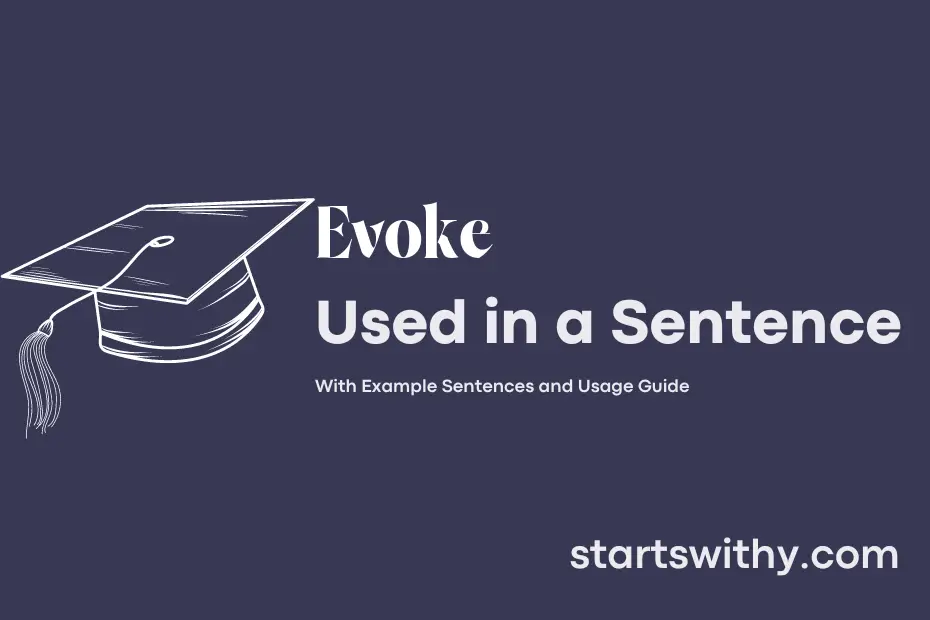Curious about the power of words to paint vivid images in our minds? Let’s explore the concept of “evoke” together. When a word or phrase has the ability to bring forth strong emotions, memories, or sensations, we say it has the power to evoke.
In writing or conversation, the word “evoke” is used to describe how language can stir up particular feelings or mental images within someone. It serves as a tool to create a connection between the writer or speaker and the audience, allowing for a deeper, more immersive experience.
7 Examples Of Evoke Used In a Sentence For Kids
- The beautiful rainbow colors can evoke a sense of happiness.
- Looking at a picture of a puppy can evoke feelings of excitement.
- Listening to music can evoke different emotions in us.
- The smell of fresh flowers can evoke memories of springtime.
- Exploring nature can evoke a sense of wonder and awe.
- Reading a book can evoke feelings of imagination and creativity.
- Creating art can evoke a sense of accomplishment and pride.
14 Sentences with Evoke Examples
- Evoke the spirit of curiosity by exploring different academic subjects beyond your major.
- Joining a cultural club can evoke a sense of unity and pride among students.
- A thought-provoking book can evoke deep emotions and stimulate critical thinking.
- Attending a live theatre performance can evoke a range of emotions and inspire creativity.
- Participating in a debate competition can evoke a sense of confidence and improve public speaking skills.
- Taking up a new hobby such as painting or photography could evoke hidden talents and passions within you.
- Visiting historic sites and museums can evoke a sense of connection to our country’s heritage.
- Connecting with classmates from diverse backgrounds can evoke empathy and understanding towards different cultures.
- Attending a motivational seminar can evoke a sense of determination and goal-setting.
- Watching a documentary on social issues can evoke a sense of responsibility towards creating positive change.
- Engaging in a volunteer project can evoke a feeling of fulfillment and empathy towards others.
- Exploring nature through hikes and treks can evoke a sense of wonder and appreciation for the environment.
- Attending a poetry reading session can evoke deep emotions and creativity in writing.
- Participating in a traditional dance workshop can evoke a sense of cultural pride and connection.
How To Use Evoke in Sentences?
To use “Evoke” in a sentence, first, identify a situation where you want to describe something that brings a particular feeling or memory to mind. For example, you may want to talk about how a song evokes nostalgia or how a painting evokes a sense of peace.
Next, think about the feeling or memory you want to convey. Is it a positive or negative emotion? Is it related to a specific time or place? Once you have a clear idea of what you want to evoke, you can construct your sentence.
For instance, you could say, “The smell of fresh-baked cookies always evokes memories of my grandmother’s kitchen.” In this sentence, the word “evokes” is used to describe how the smell of cookies brings back memories of a specific place and time.
When using Evoke in a sentence, make sure to place it in a context that clearly conveys the feeling or memory you want to evoke. This will help your audience understand the impact of the word and its connection to the situation you are describing.
Remember, Evoke is a powerful word that can add depth and emotion to your writing. Experiment with different contexts and situations to discover how to best use it in your own sentences.
Conclusion
In conclusion, the power of language to evoke emotions and imagery is evident in the carefully crafted sentences with “evoke” used in this article. By using words that evoke strong emotions or vivid visuals, writers can create a more engaging and impactful piece of writing. These sentences serve as examples of how carefully chosen words can effectively convey a mood or tone, drawing readers into the narrative and triggering their imaginations.
From summoning memories to painting detailed scenes, the sentences demonstrated the versatility of the word “evoke” in literature. As writers seek to connect with their audience on a deeper level, mastering the art of crafting sentences that evoke specific feelings or images is key. By harnessing the emotive power of language, writers can effectively communicate their message and captivate readers, leaving a lasting impression long after the words are read.



